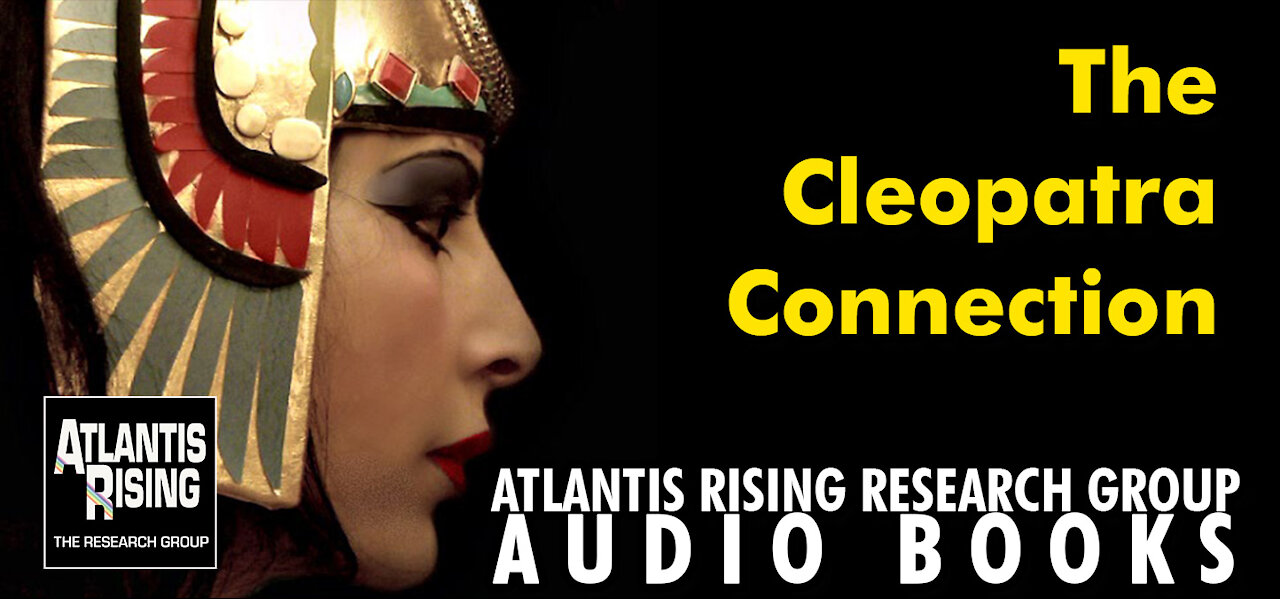Premium Only Content

The Cleopatra Connection - From Atlantis Rising Research Group News Blog
Visit Atlantis Rising Research Group at https://www.atlantisrising.com/
The Cleopatra Connection By J. Douglas Kenyon
The lost tomb of Cleopatra VII may not be lost much longer. That, at least, is the hope of archaeologists digging through ancient temple ruins at Taposiris Magna a few miles southwest of Alexandria, Egypt. Discovery there of two gilded mummies—a male and a female of high-rank—was trumpeted in a July television documentary as a “sensational” find, evidence the long-sought tomb of Cleopatra and her lover, Roman renegade Mark Antony, could be nearby.
While no final resting place has yet been confirmed, the pair’s tragic demise in 30 BC has never lacked for public interest. Mark Antony, reportedly, fell on his sword, and Cleopatra allowed herself to be bitten by an Asp. Portrayed by Elizabeth Taylor and Richard Burton, and by many writers, including Shakespeare and George Bernard Shaw, the couple’s romance, as well as the search for Cleopatra’s tomb has attracted many curious researchers. Now, according to Dr. Kathleen Martinez, archaeologist from the Dominican Republic, and a 14-year veteran of Taposiris Magna (‘tomb of Osiris’), Cleopatra considered herself an incarnation of Isis, and wanted to reenact the goddess’s heroic reassembly of the dismembered body of her husband Osiris. Not everyone, however, believes Taposiris Magna was her tomb’s location.
In the 1970s and ’80s underwater ruins at Alexandria were investigated, using ‘remote viewing’ techniques like those developed by the U.S. military and the CIA. Parapsychologist Stephan Schwartz claimed to have identified palaces built there by Cleopatra and Mark Antony. Moreover, he thought some sites there might be associated with Ptolemaic landmarks like the Pharos Lighthouse and the Alexandria Library. The Schwartz ‘Alexandria Project’—though ignored by mainstream Egyptology—was cited by many as a great demonstration of intuitive archaeology. That view was somewhat vindicated in 1998, when French archaeologists led by Frank Goddio unveiled spectacular underwater photographs of the ‘ruins of Cleopatra,’ thought to have sunk off Alexandria in a fourth-century earthquake. But even though hopes ran high for a while, no missing royal tombs have yet surfaced, and many mysteries remained unsolved.
Last of the Ptolemaic monarchs, Cleopatra traced her lineage to Alexander the Great, who, after conquering the known world, capped his brief but spectacular career by establishing the great port city at Alexandria and in 305 BC, placing his general and friend Soter on Egypt’s throne as Ptolemy I. The Ptolemaic dynasty would last for almost three centuries, abruptly ending with the death of Cleopatra VII.
The connection with Alexander the Great adds another intriguing dimension to the story. Some researchers have noted surprising and ironic parallels between the lives of Alexander the Great and Jesus the Christ. Black studies researcher Arthur Lewin (Africa is Not a Country) points out (africaunlimited.com) that, like Jesus, Alexander the Great died in his 33rd year and declared that the man married to his mother, was not his father. Alexander, indeed, believed he was the Son of God, claiming that his actual father was Ammon, king of the gods of Egypt. After defeating Persian emperor Darius in 333 BC at the Battle of Issus (a name suggesting ‘Jesus’ to some and ‘Isis’ to others), and freeing Egypt from centuries-old Persian domination, he was declared ruler of Egypt, becoming simultaneously Emperor of Persia, Pharaoh of Egypt and monarch of the entire Greek peninsula. In other words: ‘King of Kings.’
Alexander the Great, Pompeii, circa 100 BC
British author Ralf Ellis (Cleopatra to Christ), thinks there is an even deeper connection between the Ptolemaic line of Egypt and Jesus Christ. Cleopatra VII, he argues, was in fact—through her daughter Queen Thea Muse Ourania—the grandmother of Jesus.
Citing ancient sources like Josephus Flavius and the Jewish Talmud, Ellis, places the events of Jesus life about 30 years later than does standard first-century chronology, and, while dismissing the familiar tale of a poor and illiterate carpenter from Nazareth, as church propaganda, Ellis identifies Jesus the Christ as Jesus of Gamala, a historically documented Jewish high priest and king, whose birth might well have been attended by Persian wise men from the East. ‘Christ,’ or ‘christos’ is Greek for ‘anointed one,’ and refers to the old testament method of choosing the kings of Israel. The city of Gamala, incidentally, is widely considered birthplace of the Zealot movement of rebel Jews seeking to overthrow Rome.
-
 0:19
0:19
Atlantis Rising Research Group
2 years agoJoin the ATLANTIS RISING RESEARCH GROUP!
1.08K1 -
 7:42
7:42
MRCTV
3 years agoNIH Quietly Removes Gain-of-Function Research Info From Its Site
3.06K11 -
 57:23
57:23
Blitzkrieg Games
4 years agoAtlantis Rising Solo Playthrough Second Game Elf Creek
69 -
 0:09
0:09
NarcityUGC
3 years agoSmoke seen rising from Pacific Mall in Toronto.
8.97K -
 1:03:43
1:03:43
In The Litter Box w/ Jewels & Catturd
23 hours agoFlaming Crack Doodles | In the Litter Box w/ Jewels & Catturd – Ep. 721 – 1/16/2025
40.6K17 -
 1:06:42
1:06:42
Dr. Drew
5 hours agoDave Rubin: Wildfires Burn Los Angeles & CA Gov. Newsom's Last Hope Of Being President – Ask Dr. Drew
42.8K1 -
 2:08:01
2:08:01
The Quartering
6 hours agoElon Musk Has A MELTDOWN & Leaks DM's, Matt Walsh Vs OF Girls, & the WORST Video We've Ever Seen!
112K48 -
 44:54
44:54
Steve-O's Wild Ride! Podcast
6 hours ago $2.94 earnedMark Wahlberg Threatened To Beat Up Jackass Cast Member - Wild Ride #251
34.4K8 -
 LIVE
LIVE
tacetmort3m
7 hours ago🔴 LIVE - PUNISHING THEM ALL TO RANK UP - MARVEL RIVALS RANKED
100 watching -
 36:14
36:14
Capitol Spotlight
3 hours ago $0.65 earnedWho is Rep. Jim Jordan outside of Congress?
12.2K1